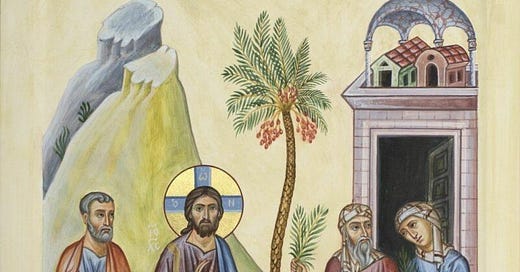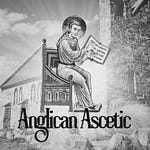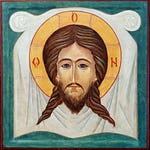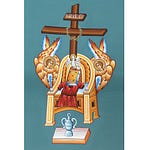Today we have gathered to meet Christ on the Mount of Olives. Today He returns from Bethany and proceeds of His own free will toward His holy and blessed Passion, to consummate the mystery of our salvation. He who came down from heaven to raise us from the depths of sin, to raise us with Himself, we are told in Scripture, above every sovereignty, authority and power, and every other name that can be named, now comes of His own free will to make His journey to Jerusalem. He comes without pomp or ostentation. As Isaiah says: He will not cry or lift up His voice, or make it heard in the street. In His incomprehensible power, Our Lord is meek and humble; He makes His entry in simplicity.
Let us run to accompany Him as He hastens toward His passion, and imitate those who met Him then, not by covering His path with garments, olive branches or palms, but by doing all we can to prostrate ourselves before Him by being humble and by trying to live as he would wish. Then we shall be able to receive the Word at His coming, and God, Whom no limits can contain, will be within us.
In His humility Christ entered the dark regions of our fallen world and He is glad that He became so humble for our sake, glad that He came and lived among us and shared in our nature in order to raise us up again to himself. And even though we are told that He has now ascended above the highest heavens – the proof, surely, of His power and godhead – His love for man will never rest until He has raised our earthbound nature from glory to glory, and made it one with His own in heaven.
So let us spread before His feet, not garments or soulless olive branches, which delight the eye for a few hours and then wither, but ourselves, clothed in his grace, or rather, clothed completely in Him. We who have been baptized into Christ must ourselves be the garments that we spread before Him. Now that the crimson stains of our sins have been washed away in the saving waters of baptism and we have become white as pure wool, let us present the conqueror of death, not with mere branches of palms but with the real rewards of His victory: our selves, our souls and bodies, spread before Him as reasonable, holy, and living sacrifice unto Him. Let our souls take the place of the welcoming branches as we join today in the children’s holy song: Blessed is he who comes in the name of the Lord. Blessed is the king of Israel.
Let us say to Christ: "Blessed is He who comes in the name of the Lord, the king of Israel." Let us hold before Him like palm branches those final words inscribed above the Cross. Let us show Him honor, not with olive branches but with the splendor of merciful deeds to one another. Let us spread the thoughts and desires of our hearts under His feet like garments, so that entering us with the whole of His being, He may draw the whole of our being into Himself and place the whole of His in us. Let us say to Zion in the words of the prophet: "Have courage, daughter of Zion, do not be afraid. Behold, your king comes to you, humble and mounted on a colt, the foal of a beast of burden."
He is coming Who is everywhere present and pervades all things; He is coming to achieve in you His work of salvation. He is coming who came to call to repentance not the righteous but sinners, coming to recall those who have strayed into sin. Do not be afraid, then: "God is in the midst of you, and you shall not be shaken."
Receive Him with open, outstretched hands, for it was on His own hands that He sketched you. Receive Him who laid your foundations on the palms of His hands. Receive Him, for He took upon Himself all that belongs to us except sin, to consume what is ours in what is His. Be glad, city of Zion, our mother, and fear not. "Celebrate your feasts." Glorify Him for His mercy, Who has come to us in you. Rejoice exceedingly, daughter of Jerusalem, sing and leap for joy. "Be enlightened, be enlightened," we cry to you, as holy Isaiah trumpeted, for the light has come to you and the glory of the Lord has risen over you.
What kind of light is this? It is that which "enlightens every man coming into the world." It is the everlasting light, the timeless light revealed in time, the light manifested in the flesh although hidden by nature, the light that shone round the shepherds and guided the Magi. It is the light that was in the world from the beginning, through which the world was made, yet the world did not know it. It is that light which came to its own, and its own people did not receive it.
And what is this "glory of the Lord?" Clearly it is the cross on which Christ was glorified, He, the radiance of the Father’s glory, even as He said when he faced his passion: "Now is the Son of Man glorified, and God is glorified in him, and will glorify him at once." The glory of which He speaks here is His lifting up on the cross, for Christ’s glory is His cross and His exultation upon it, as he plainly says: "When I have been lifted up, I will draw all men to myself." He Who through the Cross lives and reigns with the Father and the Holy Ghost, ever one God, unto the ages of ages. Amen.
This sermon has been adapted from a homily by S. Andrew of Crete (d. 740).











Share this post